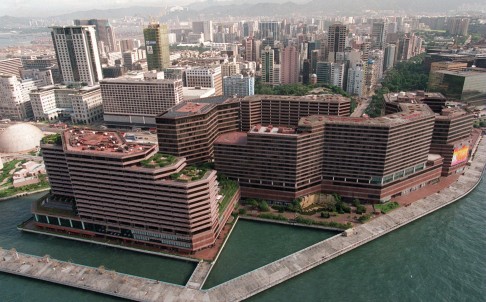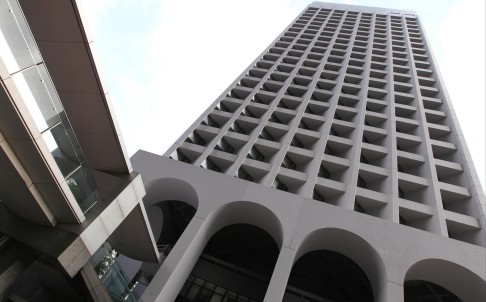Dorchester, Regent eyeing Hong Kong for new top-end hotels
The former Regent Hong Kong (left) is now an InterContinental hotel. Photo: Robert Ng
The record-breaking bid last month for the landmark Murray Building, destined to become a luxury hotel, has failed to deter global hoteliers from planning a foray into Hong Kong’s competitive hospitality market.
Ultra-deluxe British hotelier Dorchester Collection – which counts Britain’s Queen Elizabeth and Hollywood celebrities as customers – remains keen on hunting for the right location in the central business district, and Taiwanese-owned Regent Hotels & Resorts wants to stage a comeback to Hong Kong.
Property developer partners of each of those firms lost in the bidding for the 44-year–old Murray Building, the former headquarters of various government departments, to Wheelock and Co’s hotel arm, which paid HK$4.4 billion for it. The building is expected to become a Marco Polo Hongkong Hotel.
Dorchester chief executive Christopher Cowdray told the South China Morning Post that it was difficult to find the right location in Hong Kong, especially in prime districts like Central.
“Hong Kong has been on our radar screen for the last few years,” said Cowdray, who manages a portfolio of 10 hotels in such cities as London, Paris, Geneva, Beverly Hills and Los Angeles.
“We are actively looking specifically for the right location with iconic value.”
Cowdray said the future Dorchester hotel in Hong Kong would complement the rest of the hotels in the portfolio, which are located in prime locations, such as the original Dorchester in London’s Mayfair and the palace hotel Le Meurice near the Louvre in Paris.
The firm, which charges from 700 euros (HK$7,000) per standard room per night to at least 2,000 euro for a suite in its hotels in Paris, is targeting a market similar to that of the rate-setting Peninsula Hotel in Tsim Sha Tsui.
Hong Kong, as one of the top international destinations, like New York and London, has room for an ultra-luxurious hotel
“Hong Kong, as one of the top international destinations, like New York and London, has room for an ultra-luxurious hotel,” Cowdray said.
He said a Dorchester hotel in the city would ideally have about 200 guest rooms averaging 50 square metres in size.
Steven Pan Si-liang, who chairs Taiwan’s largest hotel firm, Formosa International Hotels, which owns Regent Hotels, is considering locations near Central.
“Over the past three years, nothing like the opportunity of Murray Building came by in Central,” he told the Post.
“But we believe an iconic brand like Regent will make the location work even if the future hotel is outside Central.”
Regent ended its 20-year presence in the city in 2001, when New World Development, which then owned the Regent Hong Kong on the Tsim Sha Tsui waterfront, sold the property to InterContinental Hotels, which renamed it the InterContinental Hong Kong.
The Regent brand changed hands four times before becoming part of Formosa’s stable.
“The frequent change of ownership isn’t positive for the brand,” Pan said. “But we want to bring back its legacy and glory to the city where it made its name world-famous.”
Pan said the hotelier might consider a resort-style hotel in the city.
Hotel consultancy Knight Frank said that with the limited supply of top-notch hotels and the prevalence of short-haul visitors, the industry’s focus had been shifting to boutique and resort-style hotels.
No five-star hotel has opened in Hong Kong in the past three years. -- 2013 December 2 SCMP
Murray Building sale highlights hotel yield appeal
Harbour Centre's conversion plans for Central site after HK$4.4b purchase reflect optimism
 The Murray Building in Central.Harbour
Centre Development's higher-than-expected offer for the Murray Building
in Central underscores developers' increasing optimism about hotel
investment.
The Murray Building in Central.Harbour
Centre Development's higher-than-expected offer for the Murray Building
in Central underscores developers' increasing optimism about hotel
investment.The company bought the property for HK$4.4 billion on Wednesday, aiming to convert it into a hotel.
"If we include the cost of converting the building into a hotel development, the investment cost of each room would be about HK$19 million," said Alfred Lau, a property analyst at Bocom International, adding that set a record for hotel rooms in Hong Kong.
Harbour Centre might want to build a landmark project in order to strengthen its hotel brand, Lau said.
The strong bidding for the building indicates that Harbour Centre is optimistic about the upside potential of hotels in the city.
Consultancy Knight Frank, in its annual "Greater China Hotel" report, said Hong Kong was expected this year to draw more international overnight visitors than Beijing, Shanghai, Guangzhou and Macau. However, the city's five-star hotel stock is the second-lowest among these cities, making the room rates the most expensive in this group.
In the first half of this year, no new five-star hotels opened in Hong Kong. Knight Frank expects the occupancy rate to remain stable due to the limited supply of five-star hotels.
In the property investment market, investors are willing to offer aggressive prices for hotel acquisitions.
Research by consultancy Colliers International shows Butterfly on Morrison in Wan Chai was sold at a healthy price last month. Despite the hotel providing only 93 rooms and it lacking a rating, property investment firm Gale Well paid HK$7.31 million for each room.
Rooms at Le Rivage and Domus Queen, serviced apartments in Western, sold for HK$8.88 million and HK$10 million, respectively.
An executive director at Colliers International, believes developers and property investors are willing to pay aggressive prices for hotels as they provide a higher yield.
"A hotel is probably the best investment [under the current weakening market condition]. The yield of a hotel is more than 3.5 per cent. It is higher than that of other kinds of properties. The yield for prime offices is 2 per cent only," Lo said.
"Developers and investors may treat hotels as a defensive investment as the market outlook remains positive."
However, Lau said: "We saw the demand for high-end hotels is weakening due to the poor global economy. The demand from the business sector is not strong as the businesses of some industries, such as the financial sector, are not doing well."
Lau said Harbour Centre could generate a gross operating profit of about 5 per cent from the Murray Building project. "But the margin is low. You can get a higher return if you invest in other projects," he said.
Shares of Harbour Centre Development rose 2.58 per cent to close at HK$14.34 yesterday.
This article appeared in the South China Morning Post print edition as Murray Building sale highlights hotel yield appeal. -- 2013 November 11 SCMP
Murray Building, set to be hotel, sells for more-than-expected HK$4.4 billion
Wheelock Group pays HK$4.4 billion forformer government building in Central which will be converted into aluxury hotel
The Murray Building will become a luxury hotel. Photo: Nora Tam
The
44-year-old Murray Building in Central, the former headquarters of
various government departments, was sold for HK$4.4 billion yesterday,
35 per cent higher than market expectations.
The Lands Department announced the project had been awarded to Harbour Centre Development, the Wheelock and Company hotel and property investment arm which owns the Marco Polo Hongkong Hotel.
The land price was about HK$13,535 per square foot, above market expectations of up to HK$10,000 per sq ft.
Michael Li Hon-shing, executive director of the Federation of Hong Kong Hotel Owners, said it was difficult to get a hotel site in a prime location.
"Even if we have a new development area such as the West Kowloon Cultural District, there is no site for large-scale hotel development," he said. "The Murray Building is in Central and accessible from core districts such as Admiralty. If developers have confidence in the hotel industry, naturally they would offer a higher price for Murray Building."
The Lands Department announced the project had been awarded to Harbour Centre Development, the Wheelock and Company hotel and property investment arm which owns the Marco Polo Hongkong Hotel.
The land price was about HK$13,535 per square foot, above market expectations of up to HK$10,000 per sq ft.
Michael Li Hon-shing, executive director of the Federation of Hong Kong Hotel Owners, said it was difficult to get a hotel site in a prime location.
"Even if we have a new development area such as the West Kowloon Cultural District, there is no site for large-scale hotel development," he said. "The Murray Building is in Central and accessible from core districts such as Admiralty. If developers have confidence in the hotel industry, naturally they would offer a higher price for Murray Building."
Land
lease restrictions require the winning bidder to maintain the exterior
structure of the 27-storey building in Cotton Tree Drive. The developer
will be allowed to use up to 70 per cent of the gross floor area for
hotel rooms and the remaining 30 per cent for entertainment and retail
purposes.
Li said the average room rate for high-end hotels in Central was HK$3,000 to HK$4,000 a night.
"The hotels in Central are targeting business travellers," he said. "It is true that the weak global economy has affected business travellers' spending in hotels. But the economy has up and down cycles. With back-up from the mainland, the outlook for Hong Kong's hotel market remains optimistic."
Thomas Lam, the head of research and consultancy for greater China at property consultant Knight Frank, said: "Hong Kong is facing a shortage of hotels. There is a lack of new supply of five-star hotels in the next few years,"
He said existing five-star hotels were fully occupied during the peak season, while the occupancy rate was about 70 to 80 per cent at other times.
That was higher than the average occupancy rate of 70 per cent in Macau and 60 per cent on the mainland.
Knight Frank said the average room rate for a five-star hotel had risen by more than 5 per cent in the first half of the year and was expected to rise by a further 3 per cent in the second half.
Meanwhile, Swire Properties outbid 16 developers to win a commercial site in Kowloon Bay for HK$2.64 billion, and Sino Land acquired a residential site in Sai Kung for HK$850 million.
Li said the average room rate for high-end hotels in Central was HK$3,000 to HK$4,000 a night.
"The hotels in Central are targeting business travellers," he said. "It is true that the weak global economy has affected business travellers' spending in hotels. But the economy has up and down cycles. With back-up from the mainland, the outlook for Hong Kong's hotel market remains optimistic."
Thomas Lam, the head of research and consultancy for greater China at property consultant Knight Frank, said: "Hong Kong is facing a shortage of hotels. There is a lack of new supply of five-star hotels in the next few years,"
He said existing five-star hotels were fully occupied during the peak season, while the occupancy rate was about 70 to 80 per cent at other times.
That was higher than the average occupancy rate of 70 per cent in Macau and 60 per cent on the mainland.
Knight Frank said the average room rate for a five-star hotel had risen by more than 5 per cent in the first half of the year and was expected to rise by a further 3 per cent in the second half.
Meanwhile, Swire Properties outbid 16 developers to win a commercial site in Kowloon Bay for HK$2.64 billion, and Sino Land acquired a residential site in Sai Kung for HK$850 million.
This article appeared in the South China Morning Post print edition as Murray Building sells over the odds


No comments:
Post a Comment